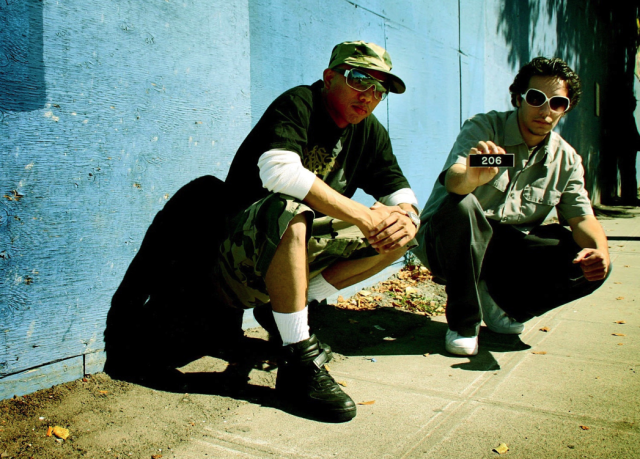The Word of the People

Phone home: MC Geologic (left) and DJ Sabzi remember their area code.
To listen to Bayani, the second full-length CD from Blue Scholars, is to hear the sound of wide-awake political resolve. The local duo set out with that determination from the beginning. DJ Sabzi (born Alexei Saba Mohajerjasbi) and MC Geologic (born George Quibuyen) met as UW undergrads helping to promote the Student Hip-Hop Organization of Washington. With Sabzi providing the beats for Geologic’s rhymes, the pair began performing together in 2002. “Our first shows were done at community centers,” Sabzi recalled in a recent phone interview. “We’d talk about culture, art, and politics, and how they all relate.”
After a successful debut CD in 2004 and the formation of the record label Mass Line in partnership with other names in Seattle hip-hop in 2006, Blue Scholars never lost that communal vibe. Their musical message should be cemented after two all-ages events at the Showbox this month to celebrate Bayani’s release. “I’d love it if each song made people want to cry, but at the same time gave them some hope,” said Sabzi. “There’s a lot of political music that doesn’t address people’s ills in a way that they can digest. We wanted to bring what’s happening in the world down to the level of human contact.”
The title of the album suggests a powerful commingling of communities. It’s a play on the fact that bayan is a word central to both the Tagalog language of the Philippines and to Farsi, spoken in Iran—Geologic is the son of Filipino immigrants, Sabzi is Iranian American. Bayan in Tagalog is a fluid word capable of suggesting both a people and their homeland; in Farsi it means “the Word.” So Bayani is no less than the Word of the People.
The album lives up to the standards of its title. Producer Sabzi, who has classical and jazz piano training, uses keyboards and vinyl to create a sonic backdrop that evokes several soulful summertime radio stations playing at the same time. “It’s kind of like sound alchemy,” Sabzi said, discussing his process. “Anything goes.” The ingratiating groove opens the door to listeners while Geologic pulls people in with rhymes like: “It’s the turning of the page / to the second chapter / the tragedy and comedy / so cue the blood and laughter / To survivors of economic and natural disaster / looking for the right here / And not the year after.” This is political music reaching not for slogans but for connection, music meant not to foment ineffectual anger but to shape, inspire, and encourage change. And hip-hop, for now, has the cred to cultivate that change.
“I’m not even attached to the word ‘hip-hop,’ ” said Sabzi. “We try to engage in music that hasn’t been taken from its roots and turned into something to sell. It just happens to be right now that what people are calling hip-hop is what’s most useful for that.” For him, for Blue Scholars, the dream of making music is about waking up others to what’s real.




